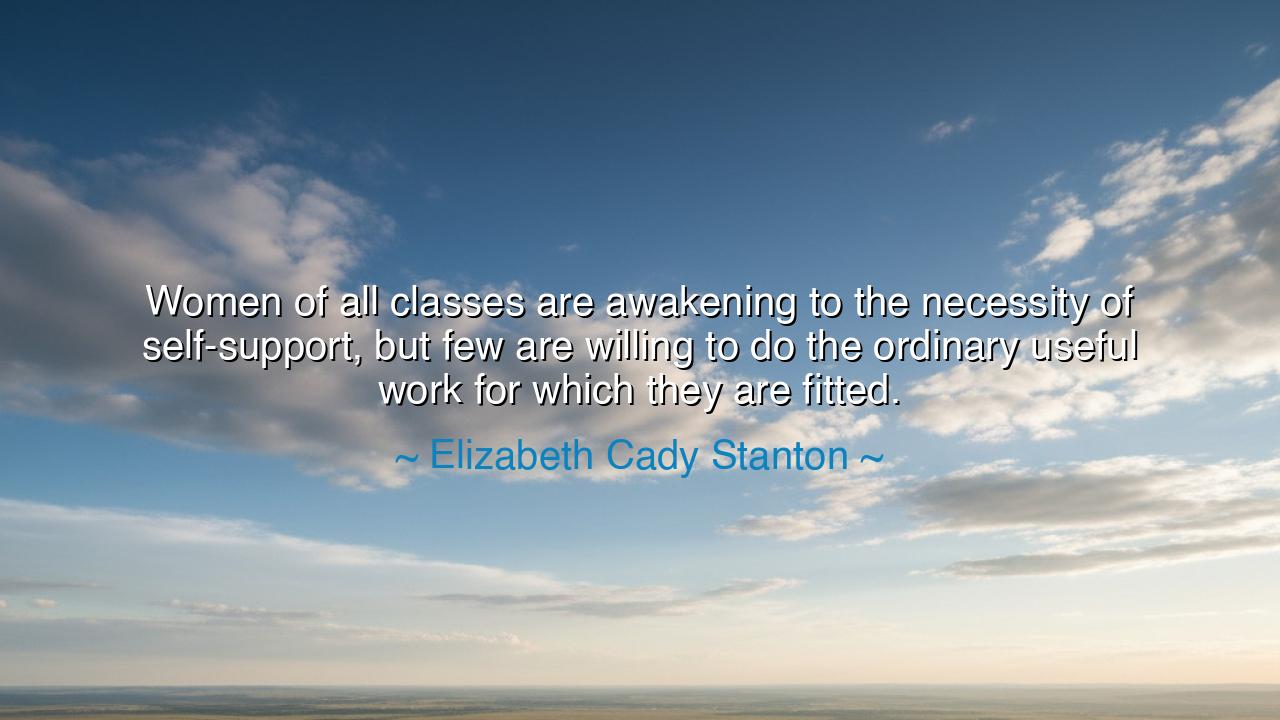
Women of all classes are awakening to the necessity of
Women of all classes are awakening to the necessity of self-support, but few are willing to do the ordinary useful work for which they are fitted.






Hear, O daughters of progress, the voice of Elizabeth Cady Stanton, who raised the banner of women’s equality in a time of chains: “Women of all classes are awakening to the necessity of self-support, but few are willing to do the ordinary useful work for which they are fitted.” In this saying, she speaks both with hope and with lament. She sees the dawn of women rising from dependence into strength, yet she warns that freedom is not won by dreams alone, but by labor, persistence, and the dignity of work.
For Stanton beheld a world where women of every class began to awaken. They saw that reliance upon father, husband, or brother was no longer sufficient for a soul that longed to be free. The call for self-support was the call of independence—the truth that true liberty lies not in permission from others, but in the ability to sustain one’s own life. Yet many, she observed, recoiled from the ordinary, practical labors that could provide such strength. They sought glory without toil, freedom without effort.
Consider the story of the early suffragists themselves. Stanton, alongside Susan B. Anthony and others, worked not in grandeur but in ceaseless, grinding labor—writing pamphlets, organizing meetings, speaking in hostile halls, enduring insults and rejection. Theirs was not glamorous work, but it was useful, and through such labor the women’s movement was born. Their struggle shows that the path to liberation is paved not only by lofty ideals, but by the willingness to endure the ordinary tasks that keep a movement alive.
Stanton’s words are also a mirror to society. For too long, women were denied access to education, trades, and professions. When at last the gates began to open, some hesitated, for the dignity of work had been hidden beneath centuries of scorn. Yet true freedom cannot rest on idleness; it must be grounded in the ability to stand, to earn, to build, to contribute in ways both humble and profound.
Therefore, let this wisdom endure: the awakening of women is not complete without action. To claim independence is to embrace both the noble and the ordinary, the exalted and the practical. Stanton’s words remind us that the road to equality is not walked in grandeur alone, but in the daily courage of women who choose to sustain themselves, to labor with purpose, and to shape the destiny of their own lives.






ABAnh Bui
Stanton’s statement speaks to the tension between necessity and societal expectations. Could it be that the women of her time were eager to become self-supporting, but were discouraged from pursuing certain types of work due to societal norms or restrictions? Does this also reflect how women today might still struggle to find opportunities that both support them financially and allow for personal growth and fulfillment in their careers?
HHHuy Hoang
This quote makes me think about the complexity of women’s roles in society, even in Stanton’s time. Was the reluctance to take on certain ‘ordinary useful work’ driven by societal expectations, or was it a desire for more meaningful or empowering work? How can we create a world where women feel they can engage in work that is both practical and fulfilling, without being confined to outdated gender roles?
QGNguyen Quynh Giao
Stanton’s quote raises an interesting point about women’s desire for self-support and independence. But what does ‘ordinary useful work’ mean in this context? Is it possible that the work women were expected to do was undervalued or simply unfulfilling? Could it be that women were awakening to the idea of self-support but seeking more meaningful work that aligned with their skills and aspirations, rather than just accepting what was available?
NMphuong nguyen minh
Elizabeth Cady Stanton’s quote speaks to a time when women were beginning to demand independence and self-sufficiency. However, I wonder if her remark about women not being willing to do ‘ordinary useful work’ reflects a misunderstanding of what truly drives women’s participation in the workforce. Could it be that women were not refusing to work, but rather rejecting the limited and undervalued roles society had designated for them?